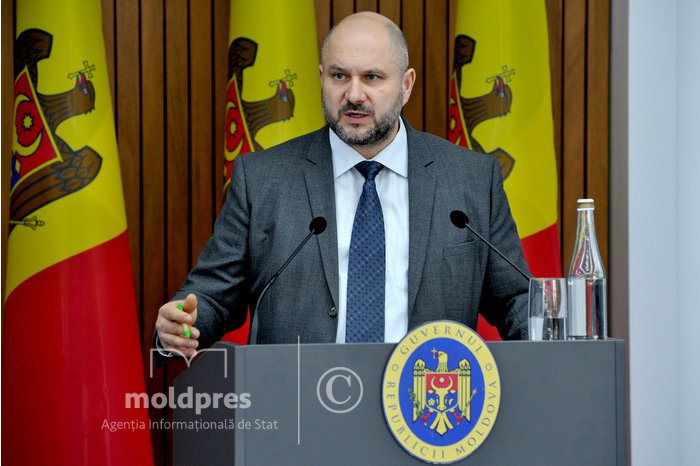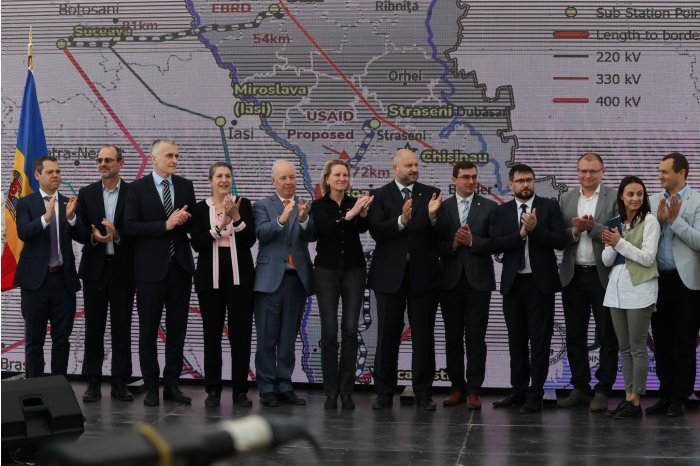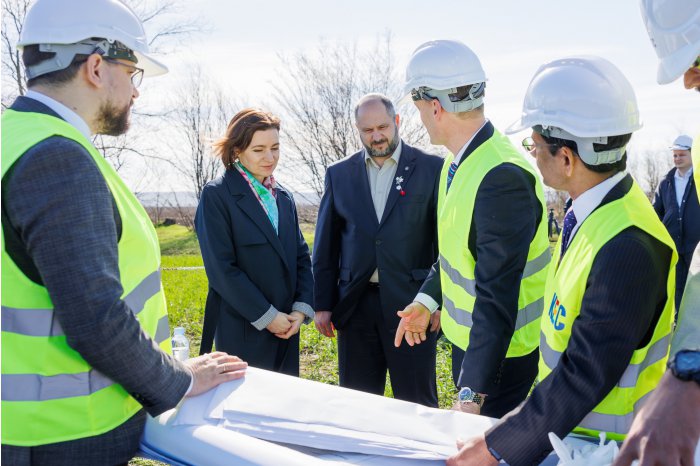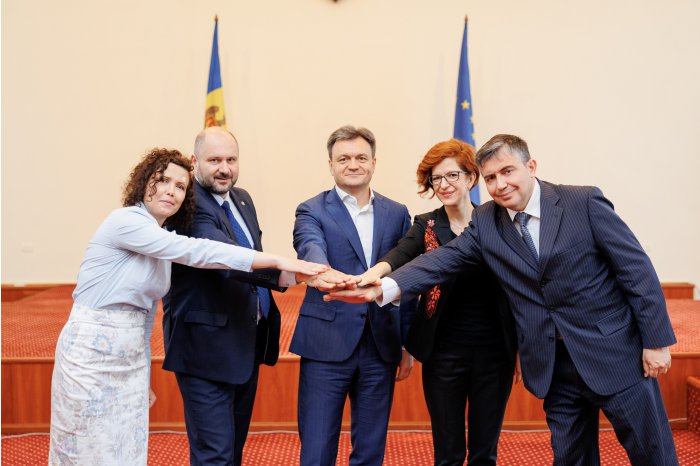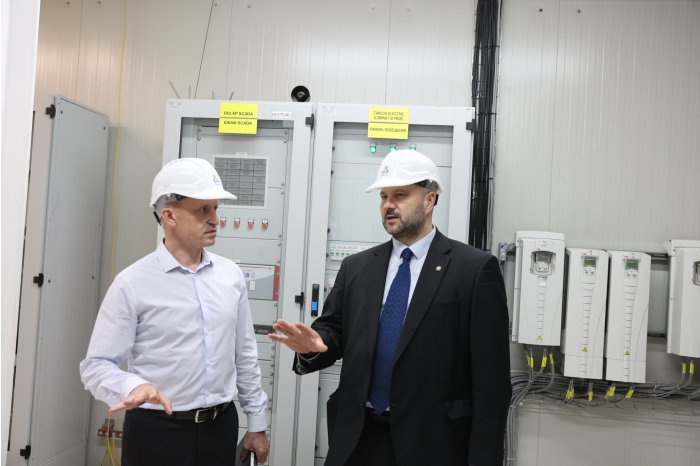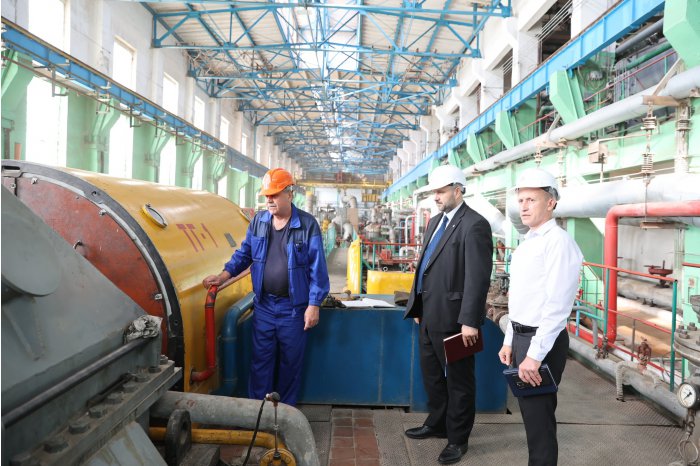EUROPEAN MOLDOVA // Energy Minister: We have every chance to become part of European energy market even before becoming EU member
13:05 | 14.05.2024 Category: Interview, Event
*Moldova applied for EU membership on 3 March 2022
* Moldova was granted EU candidate status on 23 June 2023
*On 14 December 2023, the European Council decided to open accession negotiations with Moldova
*Moldova undergoing assessment of the alignment of national legislation with European Union law, a first step for our state’s accession to the EU
*Authorities aim for Moldova to join the EU by 2030
Interview given to MOLDPRES State News Agency by Energy Minister Victor Parlicov
MOLDPRES: Mr. Minister, Victor Parlicov, the Republic of Moldova has undergone radical transformations in the energy sector in the last two years since the outbreak of war in Ukraine. What are currently the most important concerns of the institution?
Victor Parlicov: Once the energy crisis, largely caused by Russia, has been overcome, the Republic of Moldova has shown its resilience in the energy sector and diversified its energy supply sources, with the essential support of our Western partners, both politically and financially and, last but not least, with expertise. This has allowed us to focus on long-term development plans that will provide the country's consumers with secure, sustainable and competitively priced and affordable energy. I believe that, more than a year after the establishment of the Ministry of Energy, we have much to be proud of in all areas of responsibility. In the natural gas market, which legally had been liberalised since 2016, we are now moving into a new era, from a single supplier with a single price, to multiple suppliers with different prices and opportunities for different types of consumers. On the Romanian Commodity Exchange, active in Chisinau through BRM East Energy, natural gas is already being traded, including gas purchased by Moldovagaz at prices lower than the contract with Gazprom. In the electricity sector, we are moving forward with the construction of interconnections with Romania, so as to integrate into the European energy market. This year will also see the launch in Chisinau of OPEM - the subsidiary of the Romanian energy exchange, OPCOM - which will operate the energy markets during the day and for the following day, linked to the Romanian market and through it to the European market. Soon, however, we will launch tenders for the construction of large renewable power plants - 165 MW of wind and photovoltaic parks, which will attract investments of almost €200 million into the economy. In the field of energy efficiency, we have been working on the launch of the residential energy efficiency fund, managed by the National Centre for Sustainable Energy. Over the next three years, it will invest around 1.4 billion lei in reducing energy costs for almost 9,000 homes. More than 507,000 square metres of housing will undergo renovations that will lead to energy savings of up to 40%. We are also making progress in the thermo-energy sector, with a tender currently underway for the construction of two co-generation power plants with efficient internal combustion engines. These will also contribute to the production of balancing energy for the energy system. In parallel, we are working on the transposition of European legislation in the energy sector and all these actions aim to become a carbon neutral country by 2050, in line with or even ahead of the European Union.
MOLDPRES: Please tell us why the right bank of the Dniester River no longer consumes gas of the Russian company Gazprom as of 2022 and why it was important to synchronize the domestic energy system with the European Network of Transmission System Operators (ENTSO-E)?
Victor Parlicov: In November 2022, Russia organized a very tough stress test for the Moldovan energy system. Gazprom unilaterally cut gas supplies and the Russian-controlled Cuciurgan power plant refused to deliver electricity. We then had the choice of consuming the gas volumes on the right bank of the Dniester, sharing them with the left bank or passing them on to the Transnistrian region. At that time, Russian gas was abandoned and gas was purchased from the European market and even from the United States, at lower prices than Gazprom was offering us. During all this time, we have saved about $60 million compared to the Gazprom price. The decision to buy gas from other suppliers is not only for economic reasons, but also for security reasons. At the same time, by buying energy from the Cuciurgan power plant and not just from Romania, we have saved our consumers another 20 million dollars and maintained social stability in the region. Synchronisation with ENTSO-E was primarily a political decision and it was an extraordinary one, because normally this process takes decades, and in the case of Moldova and Ukraine it took only three weeks.
It was a turning point in ensuring the security and stability of Moldova's energy system, and now the power systems of Moldova and Ukraine operate as a single control block within the European grid of power system operators. In the future, the synchronisation of the power grids of the Republic of Moldova with ENTSOE allows us to diversify the sources and routes of electricity supply and ensure energy security in the region.
MOLDPRES: At the end of this year, the contract for the transit of Russian natural gas through Ukraine expires. What risks are there for the Transnistrian region, which continues to consume Russian gas, and what measures is Chisinau considering to avoid leaving the inhabitants of the left bank of the Dniester in cold and darkness in the middle of winter?
Victor Parlicov: Chisinau has the political will to maintain stability in the Transnistrian region and we will not obstruct the gas supply from Gazprom, even after the contract with Ukraine expires. But alternative solutions are needed if gas cannot be transported on the traditional route from the east directly to the Transnistrian region. Technically, it is possible to deliver gas to the Transnistrian region via the Turkish Stream route and then via the Transbalkan route in reverse physical mode.
MOLDPRES: Recently, the construction of 400 kV Vulcanesti - Chisinau overhead power line started in Congaz. At the same time, work is underway on the following interconnection lines with Romania: Balti-Suceava and Straseni-Gutinas. When do you expect these objectives to become operational and what benefits will they bring to consumers in Moldova?
Victor Parlicov: 400 kV Vulcanesti - Chisinau overhead power line, the construction of which has already started, will allow us to increase the country's energy security and ensure the electricity supply to consumers in Moldova. The Vulcanesti-Chisinau line is expected to be put into operation by late 2025. At the same time, we are currently working on two other interconnection lines with Romania, the Balti-Suceava and Straseni-Gutinas. The European Bank for Reconstruction and Development is giving us a loan of €30.8 million, the European Investment Bank another €30.8 million and the European Union a grant of €15.4 million through the Neighbourhood Investment Platform. The third high-voltage power line that will interconnect us with Romania between Straseni and Gutinaș is financed by the United States Government through USAID, and a memorandum was signed on 30 April. Under the agreement, the construction of the Balti - Suceava line is scheduled to be completed by late 2027, while the construction of the Strășeni - Gutinaș line will start in 2025.
MOLDPRES: Energy Market Operator M, the subsidiary of the Romanian energy exchange OPCOM, has got a license to operate on the electricity market in the Republic of Moldova. At the same time, the Romanian Commodity Exchange, through its company in Chisinau, recently announced the successful operationalization of the first electronic platform for the purchase of natural gas. What does this mean for consumers in Moldova?
Victor Parlicov: After the launch of the OPCOM branch in our country, short-term intra-day and day-ahead energy markets will be set up, which will allow hourly trading of electricity on the wholesale market with different prices. This will follow the example of the European energy markets, where we are integrating - with multiple suppliers competing with each other and eventually offering more competitive prices to consumers.
MOLDPRES: In the first two days of April, consumers in the Republic of Moldova (right bank of the Dniester River) used gas from the United States, delivered through the Greek port Alexandroupolis. This is a test volume of liquefied natural gas, imported by Energocom from the Greek company DEPA. What are the prospects for Moldova?
Victor Parlicov: The main purpose of this test purchase, as stated in the Energy Strategy of the Republic of Moldova by 2030, is to ensure the security of natural gas supply by diversifying supply routes and sources, types of carrier (conventional, unconventional, liquefied natural gas) and storage facilities, while strengthening Moldova's role as a transit corridor for natural gas to underground storage facilities in Ukraine and to consumers in European countries.
MOLDPRES: Given the changes on the energy market, what role will Moldovagaz play on the Moldovan energy market?
Victor Parlicov: As I said earlier, if for 30 years we were used to a single gas supplier, which could dictate political conditions when we talked about energy, now we are entering a new era in the gas market. Several European gas suppliers are registered in Moldova, and Moldovagaz, as a public service provider, can purchase gas from any of them. One such tender has already been held in April to procure the quantities needed for May.
MOLDPRES: Mr Parlicov, an important role in ensuring Moldova's energy security can be played by the production of energy from renewable sources. At the beginning of this year, the Ministry of Energy published the calendar of tenders for the construction of large renewable energy capacities, aiming at the construction of the large wind and photovoltaic parks you mentioned. Are foreign companies interested in investing in Moldova's energy sector?
Victor Parlicov: We are looking for increased interest from foreign companies to invest in the energy sector in Moldova. We are glad to see this and our efforts are focused on organizing a process with maximum transparency and fairness. We showed this conviction during the public consultations on the law on renewable energy sources that makes it possible to organize these tenders. We want to stick to this principle in the future, in order to strengthen confidence in the state authorities. Also, to boost the participation of foreign companies, just recently, on 25 April, a workshop was held, where we discussed the tender documentation with representatives of foreign companies.
In this way, we aim to ensure a balance between the private interest in contributing to the development of the market on the one hand and the consumer interest in affordable energy prices on the other.
MOLDPRES: Since independence, Moldova has had only one alternative - gas from the Russian Federation and electricity from the Transnistrian region. In the last two years, the authorities have been looking for alternative sources to provide Moldova with energy resources. You recently said that Moldova could become part of the EU's common energy market before becoming an EU member state. What could the EU energy market offer to Moldovan consumers compared to what they had until recently, before the outbreak of the war in Ukraine?
Victor Parlicov: The European Union is a mature market, with clear rules for everyone, and special care for consumer protection. This is what we want for our citizens. By building the physical interconnection infrastructure, but also by transposing European legislation and making electronic trading platforms operational, the Republic of Moldova is connecting with European markets. I said, we have every chance of becoming part of the European energy market even before we become members of the EU. The European Union is a leader in promoting renewable energy and decarbonising the economy, with the objective of having net zero greenhouse gas emissions by 2050. By aligning with these goals, we are creating new business opportunities in Moldova and laying the foundations for green economic growth.
Thank you for the interview!
Reporter: Natalia Sandu
